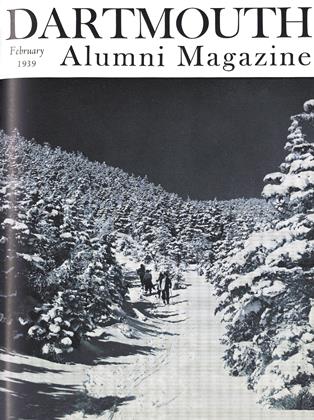BELOVED DEAN-EMERITUS ENJOYS LEISURE OF HIS RETIREMENT
PRESIDENT TUCKER once wrote a book called The Reservation ofTime which impressed Craven Laycock and possibly affected his decision to quit the deanship before the compulsory retirement age of three score and ten. The book is concerned with that period on the long end of a man's life when, if he has providently lain by the wherewithal, he may lay down his burdens, enjoy leisure, and have time for quiet contemplation of the past and present.
This is what Craven Laycock is now doing; he is humanly happy that he may do whatever he pleases, and there must be genuine satisfaction for him in his retrospection of past years, the richness of which thousands of Dartmouth men will attest. He has never regretted his retirement, and since that day he has never known a dull hour nor an unhappy one.
Dean and Mrs. Laycock live during the summer in their home on Rope Ferry Road, and repair each fall to Room Number One, The Hanover Inn, to escape the tribulations of winter housekeeping. This is as far south as they choose to go for the winter—a matter of three or four blocks, much more convenient than Palm Beach and a lot more interesting.
The Dean Emeritus eschews traveling. It tires him, it is none too good for the health, and he likes his days in Hanover anyway. He receives scores of requests each year for speeches at alumni meetings, and impartially refuses them all, much as he loves to renew old friendships and recount familiar tales. He is piqued, however, by the suggestion that life in retirement at Hanover could be dull. In his winter quarters at the Inn, he is continuously called upon by friends among the alumni visiting the College, and takes great joy in hearing of the strivings and successes of men whom he knew long years before.
The only wistful note in his daily life lies in the diminution of personal relationships with the ever-changing undergraduate body. This is the thing he has missed most in retirement. He inevitably comes to know a dozen or so of each class, and enjoys their friendship immensely, but the multitude of student friendships inherent in the work of a dean has passed. Not that the students don't know himeven though his famous opening speech to the freshmen is now discontinued—he becomes known to all seniors in his talks just before commencement time, not only as a great and beloved figure in the Dartmouth family, but as the College's silvertongued orator of all time.
 View Full Issue
View Full Issue
More From This Issue
-
 Sports
SportsBig Green Teams
February 1939 By Whitey Fuller '37 -
 Article
ArticleA Freshman Writes Home
February 1939 -
 Class Notes
Class Notes1937*
February 1939 By DONALD C. MCKINLAY -
 Class Notes
Class Notes1929*
February 1939 By F. WILLIAM ANDRES -
 Class Notes
Class Notes1921*
February 1939 By CHARLES A. STICKNEY JR. -
 Class Notes
Class Notes1918*
February 1939







